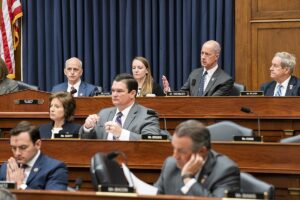
The House on Tuesday evening voted to pass the final conferenced version of the $741 billion fiscal year 2021 National Defense Authorization Act with a veto-proof majority, as the White House issued another formal veto threat. Lawmakers voted 355 to 78 to pass the bill, well above the two-thirds approval mark that would be required to override a potential veto. “After months of hard work with colleagues on both sides of the aisle and in both chambers of Congress, I…

 By
By 










